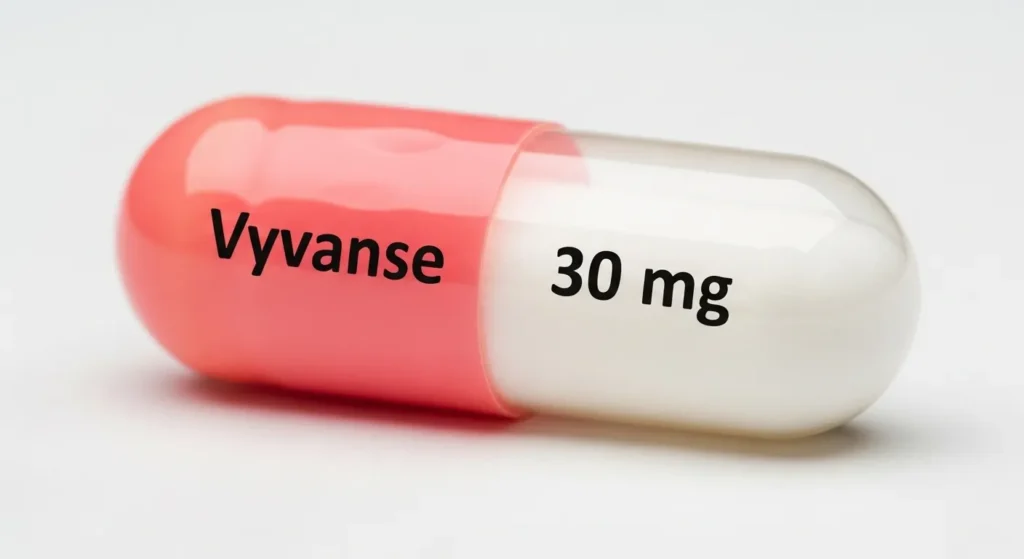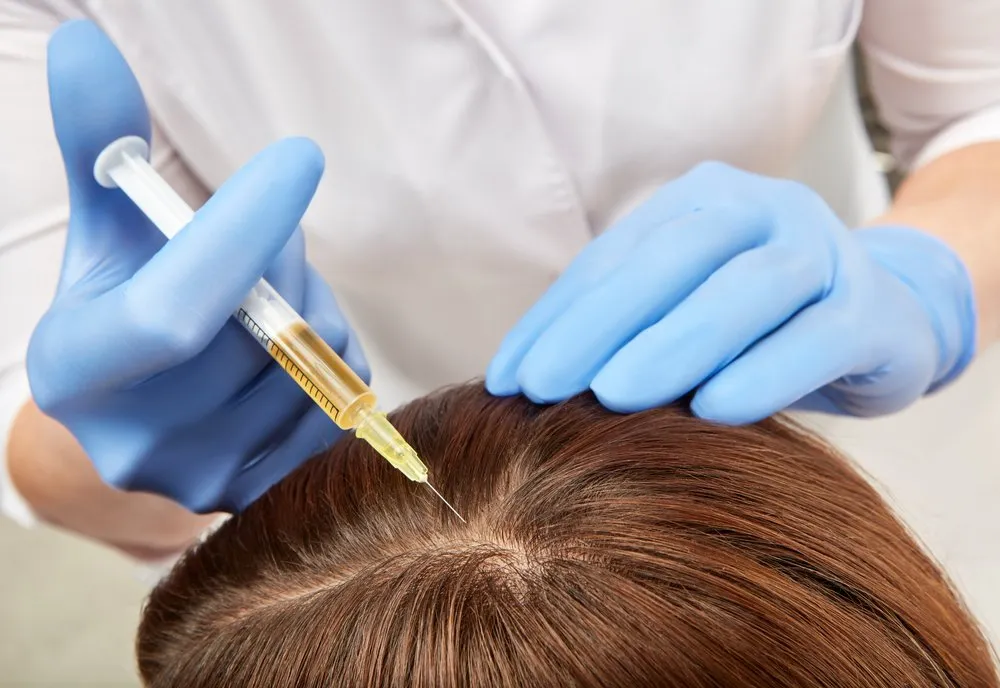Noticing unexpected hair shedding after starting Vyvanse? You’re not alone. Many people ask, “Does Vyvanse cause hair loss?” Vyvanse (lisdexamfetamine) is commonly prescribed for ADHD and binge eating disorder, but some users report noticeable thinning hair.
In this article, we’ll explore the potential connection between Vyvanse and hair loss, highlight what experts say, and offer practical solutions. If you’re concerned about your treatment and your hair health, this guide will help you make informed, confident decisions.
What Is Vyvanse and How Does It Work?

Overview of Vyvanse (Lisdexamfetamine)
Vyvanse is a prescription stimulant medication approved to treat Attention Deficit Hyperactivity Disorder (ADHD) and binge eating disorder in children and adults. Its active ingredient, lisdexamfetamine, is a prodrug — meaning it only becomes active after it’s processed in the body.
Common Uses — Primarily for ADHD and Binge Eating Disorder
Vyvanse helps:
- Improve focus and attention
- Reduce impulsivity
- Control binge eating behaviors
Its long-acting formula makes it a preferred option for many patients seeking once-a-day dosing.
How It Affects the Body and Brain
Once metabolized, Vyvanse releases dextroamphetamine, which increases levels of dopamine and norepinephrine in the brain — chemicals involved in attention, reward, and motivation. However, altering brain chemistry may also have unintended side effects, including possible hair thinning in some individuals.
Reported Side Effects of Vyvanse
Common Side Effects
- Insomnia or sleep disturbances
- Loss of appetite
- Anxiety or irritability
- Dry mouth
- Increased heart rate or blood pressure
Rare or Less Common Side Effects — Including Hair Loss
While hair loss is not officially listed as a common side effect in the prescribing information, several patients report excessive shedding, hair thinning, or changes in hair texture while taking Vyvanse.
Can Vyvanse Cause Hair Loss? What the Research and Patients Say
Is Hair Loss Listed as an Official Side Effect?
No. The FDA label and most pharmaceutical guides do not list hair loss as a known side effect of Vyvanse. However, that doesn’t mean it’s impossible — rare or off-label side effects can still occur.
Anecdotal Reports from Patients
Many online forums, such as Reddit’s r/ADHD and Drugs.com reviews, contain user experiences linking Vyvanse to hair loss. These patients often notice:
- Increased shedding within the first few weeks of starting Vyvanse
- Hair becoming brittle or thin
- Some regrowth after discontinuing the drug
Possible Mechanisms — Stress, Nutritional Deficiency, or Hormonal Response
Experts believe hair loss could be indirect:
- Stress-induced shedding (telogen effluvium) due to overstimulation
- Appetite suppression leading to nutritional deficiencies (iron, biotin, zinc)
- Hormonal changes or altered metabolism affecting the hair growth cycle
How to Tell If Vyvanse Is Causing Your Hair Loss
Timeline of Symptoms After Starting Medication
Hair loss linked to medication usually starts within 2–8 weeks of use. If you notice increased hair shedding or hairline thinning shortly after starting Vyvanse, this could be a red flag.
Ruling Out Other Causes of Hair Loss
Before blaming Vyvanse, rule out more common causes:
- Genetics (androgenetic alopecia)
- Hormonal imbalance (thyroid, PCOS)
- Stress and illness
- Nutrient deficiencies (iron, B12, D, zinc)
Importance of a Professional Diagnosis
Always consult a dermatologist or trichologist to assess the root cause. They may perform:
- Scalp examination
- Hair pull test
- Blood work for nutritional or hormonal imbalances
What You Can Do If You Suspect Vyvanse Is Causing Hair Loss
Speak with Your Prescribing Doctor First
Do not stop Vyvanse abruptly. Instead:
- Discuss symptoms with your doctor
- Explore if dose adjustments are possible
- Evaluate if alternative ADHD medications might be a better fit
Possible Adjustments — Dosage Changes or Alternative Medications
Your doctor may suggest:
- Lowering your Vyvanse dose
- Trying a different stimulant (like Concerta or Ritalin)
- Switching to non-stimulant options (like Strattera or Intuniv)
Supportive Treatments for Hair Health
Whether or not Vyvanse is the culprit, these steps can help:
- Biotin or zinc supplements
- Hair growth serums (e.g., minoxidil, under doctor’s supervision)
- PRP therapy or low-level laser therapy
- Nutritious, protein-rich diet

Alternatives to Vyvanse That May Not Trigger Hair Loss
Non-Stimulant ADHD Medications
- Atomoxetine (Strattera)
- Guanfacine (Intuniv)
- Clonidine (Kapvay)
These may work well without the appetite and stress-related issues that stimulants can cause.
Lifestyle and Cognitive Approaches
- CBT (Cognitive Behavioral Therapy)
- Mindfulness and meditation for focus
- Exercise routines for natural dopamine boosts
Natural Supplements (Use with Caution)
- Omega-3 fatty acids
- Magnesium
- L-theanine
Always consult a doctor before changing medication or starting supplements.
When to See a Dermatologist or Trichologist
Signs It’s Time to Get a Hair Loss Evaluation
- Persistent shedding for more than 2 months
- Bald spots or visible scalp
- Hair not regrowing after discontinuing Vyvanse
Diagnostic Tests May Include:
- Ferritin and iron studies
- Thyroid panel
- Vitamin D and B12 levels
- Hormonal testing (especially for women)
FAQs About Vyvanse and Hair Loss
Q1: Does hair grow back after stopping Vyvanse?
Yes, in many cases, hair regrowth resumes within 3–6 months after discontinuation.
Q2: How long after starting Vyvanse does hair loss begin?
Typically, within 2 to 8 weeks, if related.
Q3: Can Vyvanse cause low iron or nutrition-related hair loss?
Indirectly, reduced appetite may cause deficiencies that contribute to shedding.
Q4: Is Vyvanse-related hair loss permanent?
No, most cases are reversible if identified and treated early.
Q5: Should I switch medications if I suspect Vyvanse is causing hair loss?
Consult your doctor — alternative treatments are available.
Balancing ADHD Treatment and Hair Health
While Vyvanse isn’t commonly associated with hair loss, some individuals may experience it due to indirect effects. Recognizing the signs early, working with healthcare providers, and addressing underlying issues can help preserve both your mental focus and hair health. Always prioritize professional evaluation before making changes to your medication.
If you’re concerned about thinning hair while taking Vyvanse, don’t wait. Book a consultation with Dr. Rana Irfan in Islamabad today for a personalized evaluation and expert treatment options. We’ll help you uncover the cause and support you every step of the way on your recovery journey.
